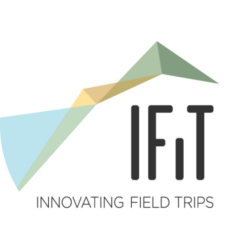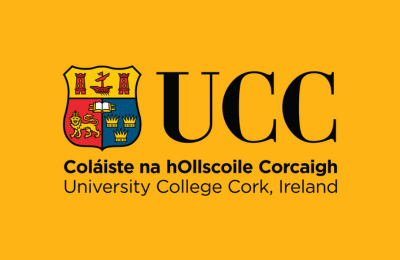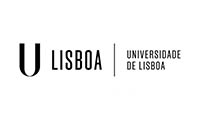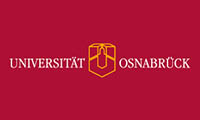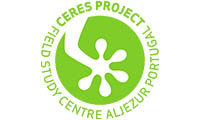Blog
IFiT Student Field Trip May/June 2019 (Blog 1- Gary Kett)
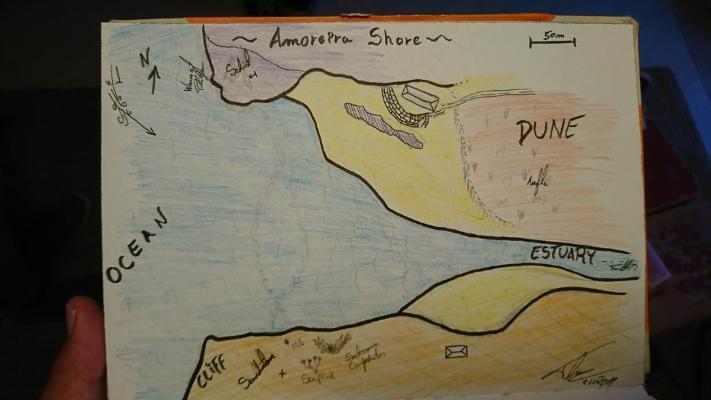
Welcome to the first blog post of the Innovating Field Trips (IFiT) Erasmus+ programme. IFiT is an integrated, field-based research project which brings together scientists, educators and students from a range of natural science fields such as geology, geography, ecology, plant science, marine biology and zoology. Our group consists of undergraduate, Masters, and PhD students from Ireland, Portugal and Germany, so not only are we learning through immersive field-based research, but also by living together, sharing our backgrounds, cultures, and interests. Because of this, we have noticed how easy and enjoyable it is to learn from each other’s interests and expertise compared to traditional learning methods.
A little about me, my name is Gary Kett, I’m from Ireland and I’m currently doing my PhD in Zoology in University College Cork (UCC). My PhD research focuses on the impacts of a changing coastal climate on the health of aquatic invertebrates. I am also interested in marine mammals, fish, birds, bats and bees. The reason I wanted to join this project was to immerse myself in an international, inter-disciplinary team of like-minded people, to fine-tune my field-based research techniques, and to gain further knowledge on the integration of geology, ecology and the social science aspect of peoples interaction with nature. So far all those goals have been met and exceeded.
Last Monday, 8 students from UCC in disciplines including Earth science, ecology, marine biology, marine and coastal management and zoology flew from Cork to Faro to join geologists and biologists from the University of Lisbon and a geographer from the University of Osnabrück at the CERES International field study centre, where the Erasmus program is being hosted. We were met with a warm Algarvian welcome al the CERES centre in Aljezur which is situated in the natural park Park (Parque Natural do Sudoeste Alentejano e Costa Vicentina) only a few km from Amoreira beach where the Aljezur river (Ribeira de Aljezur) enters the sea from its source 18 km away in the Monchique mountains. Together we are collecting ecological, geological and societal data on the whole system from the mountainous forests, where native cork oak (Quercus suber) is harvested alongside non-native eucalyptus (Eucalyptus globulus) plantations, through the farmed and pastured alluvial floodplains and town of Aljezur, to the Amoreira estuary which is a Special Protected Area, Natura 2000 site and special habitat for birds where dunes stretch as far as the eye can see, and then on to the Amoreira beach where tourists, surfers and locals enjoy beautiful waves and cliffs.
We have split up into four groups to study each of the sites (forest, valley, estuary and shore) with biologists and geologists from different countries in each group. It has been fascinating and really engaging to learn about other disciplines in a non-traditional way of learning. We’re teaching each other methods and gaining new perspectives on our own areas of expertise. On top of learning about the biology and geology of the area, we are also getting involved with the local community in Aljezur, a truly friendly, interesting, peaceful and diverse group of people. We went to the local farmers market on Saturday with a short questionnaire which gave us invaluable insight into how the local community views the area in general, their perception and use of the habitats, how they feel the area is being managed and their opinions on how it could be improved. We are all learning and experiencing the social aspect of natural sciences, understanding the importance of integration and engagement for healthy interactions between people and nature.
Each day we head out to our field sites with a large selection of equipment, take notes, collect samples for analysis, record observations, and map the habitats and distribution of plants and animals. When we return to our beautiful shared home/office at CERES we usually input data, examine samples, and discuss what we observed in the field. Each day a different group is in charge of cooking dinner and so far, we have been eating feasts like we never imagined. Delicious and endless spreads of culturally diverse dishes, German, Portuguese, Spanish and Irish influence, all environmentally friendly and quite healthy. Getting to know each other has been, in my opinion, the greatest part of the programme. Brilliant, beautiful, and boundless people, like-minded enough that we all immediately clicked yet diverse enough to learn from each other in many ways.
The following blogs will focus on specific projects, tasks and adventures. Stay tuned for more exciting updates and pictures as we finish out the week which, if it goes half as well as the first week, we will all leave here as satisfied, more informed and integrated, and more improved.
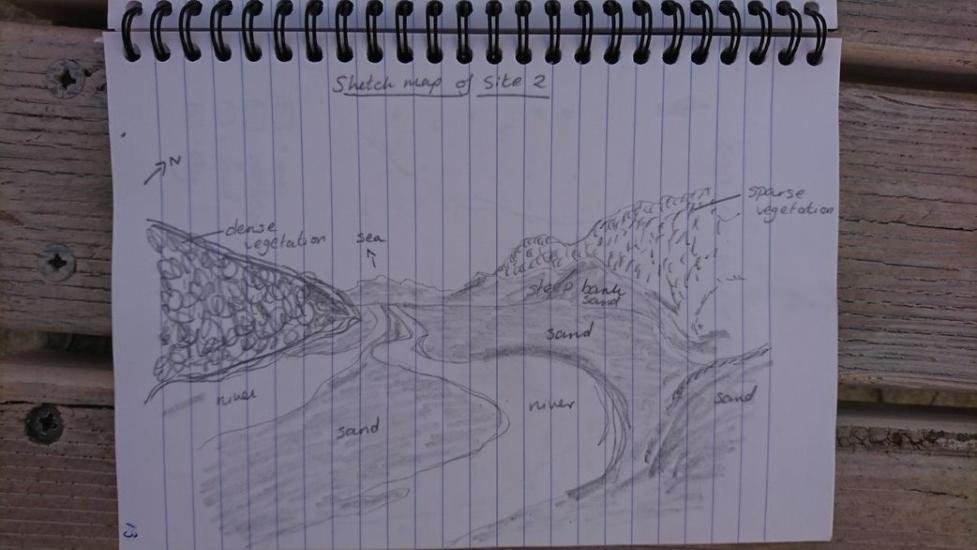
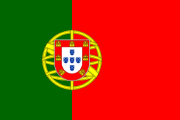
Sejam bem-vindos ao primeiro post no blog do Innovating Field Trips (IFiT), do programa Erasmus+. O IFiT é um projecto,
Sejam bem-vindos ao primeiro post do blog do programa Erasmus + Innovating Field Trips (IFiT). O IFiT é um projeto de pesquisa integrado, que tem por base saídas de campo, que reúne cientistas, educadores e estudantes de uma variedade de campos de ciências naturais, como geologia, geografia, ecologia, ciência de plantas, biologia marinha e zoologia. O nosso grupo é composto por alunos de finalistas, mestrado e doutoramento da Irlanda, Portugal e Alemanha, portanto, nao estamos a aprender somente através de pesquisa imersiva de campo, mas também a viver juntos, e a compartilhar os nossos passados, culturas e interesses. Desta maneira, percebemos o quão fácil e agradável é aprender com os interesses e a experiência de cada um em comparação com os métodos tradicionais de aprendizagem.
O meu nome é Gary Kett, sou da Irlanda e estou fazer o meu PhD em Zoologia na University College Cork (UCC). O meu trabalho de doutoramento centra-se nos impactos do sistema costeiro em alteração na saúde dos invertebrados aquáticos. Também estou interessado em mamíferos marinhos, peixes, pássaros, morcegos e abelhas. A razão pela qual eu me quis juntar a este projeto era fazer parte de uma equipa interdisciplinar internacional de pessoas com as mesmas intençoes, afinar as minhas técnicas de pesquisa de campo sobre a integração da geologia, ecologia e o aspecto social das pessoas com a natureza a fim de alargar o meu conhecimento. Até agora, todos estes objetivos foram alcançados e superados.
Na segunda feira passada, oito estudantes da UCC de disciplinas incluindo ciências da terra, ecologia, biologia marinha, gestão corrida marinha e zoologia, partiram de Cork para Faro para se juntarem a geologos e biólogos da universidade de Lisboa e uma geógrafa da University of Osnabrück na CERES Internacional study center, onde o programa Erasmus está a decorrer. Fomos recebidos com umas boas vindas algarvias calorosas no CERES Center em Aljezur, que se encontra situado no parque natural do sudoeste alentejano e Costa vicentina, apenas a alguns quilómetros da praia da Amoreira onde a ribeira de Aljezur encontra o mar a 18 km da nascente. Juntos fizemos uma amostagem ecológica, geológica e sociatal por todo este sistema, desde as florestas da montanha, onde o sobreiral (Quercus suber) é recolhido juntamente com o não nativo eucalipto (Eucalyptus globulus), passando pelas zonas agrículas e de pastoreio nas zonas aluviais junto à cidade de Aljezur, ao estuário na praia da Amoreira, que é uma área protegida, um local Natura 2000 e um habitat especial para pássaros, onde as dunas se estendem até as perdermos de vista e por fim, a praia da Amoreira, onde os turistas, surfistas e residentes locais aproveitam ondas e arribas fantásticas.
Nós dividimo-nos em quatro grupos para estudar cada um destes sítios (floresta, vale, estuário e a costa) com biólogos e geólogos de diferentes países em cada grupo. Tem sido fascinante aprender sobre outras áreas científicas desta forma um tanto não tradicional de aprendizagem. Acabámos por ensinar os nossos métodos uns aos outros e a ganhar novas perspectivas nas nossas próprias áreas. Para além de aprender sobre a biologia e a geologia da região, estamos também em Aljezur, um sítio verdadeiramente amigável, interessante e pacífico com uma grande diversidade de pessoas. No sábado passado fomos ao mercado local onde questionámos a comunidade local acerca da sua visão sobre o estado ecológico da região e como é que esta pode ser melhorada. Estamos todos a aprender bastante sobre o aspecto social das ciências naturais, assim como a sua importância para uma interação mais saudável entre pessoas e natureza.
Todos os dias, deslocamo-nos para as nossas áreas de estudo com uma seleção alargada de equipamento, tomamos notas, recolhemos amostras para análise, observamos e mapeamos os habitats. Quando voltamos à nossa maravilhosa casa, onde examinamos e discutimos as amostras e os dados recolhidos no campo. Cada grupo é também responsável pelas limpezas e cozinhar o jantar à sua vez. Temos tido banquetes inesquecíveis, com uma variedade cultural enorme, desde pratos tipicamente portugueses, alemães, irlandeses, espanhóis e até gregos, sempre com um ambiente muito amigável e bastante saudável. A oportunidade de nos conhecermos uns aos outros tem sido, para mim, a melhor parte de todo o programa. Mentes brilhantes, maravilhosas e sem limites, semelhantes de tal maneira que houve um click imediato ainda que diverso o suficiente para que conseguíssemos aprender uns com os outros das mais diversas maneiras.
Os blogs seguintes vão focar-se em projectos, tarefas e aventuras. Mantenham-se ligados para novidades excitantes e fotografias enquanto está última semana decorre. Se decorrer tão bem como a primeira iremos sair desta experiência bastante satisfeitos, mais informados, integrados e melhorados a todos os níveis.
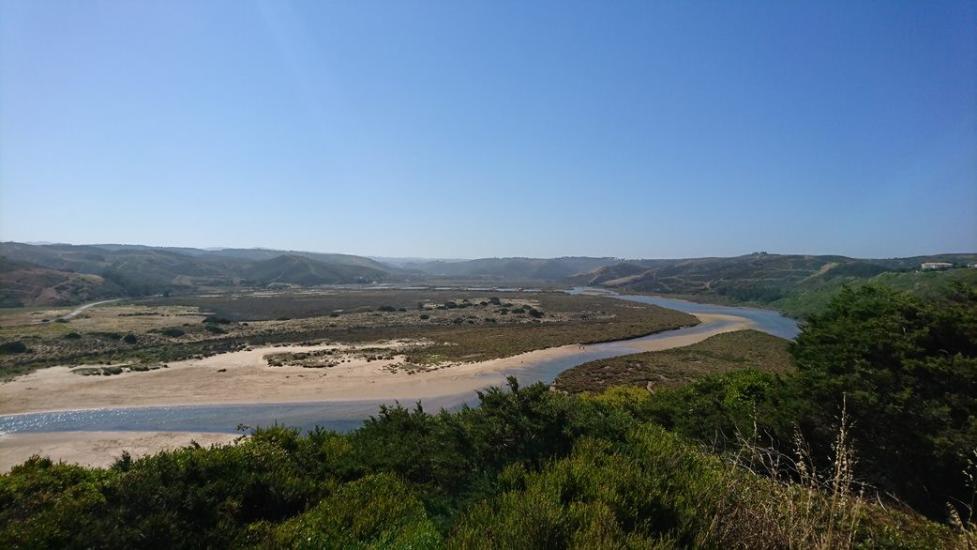

Herzlich Willkommen zum ersten Blogeintrag des Innovating Field Trips (IFiT) Erasmus+ Programms. IFit ist ein integriertes, praxis-orientiertes Forschungsprojekt das Studierende, Lehrende und Wissenschaftler verschiedener Disziplinen zusammenbringt. Die Teilnehmenden kommen aus der Geologie, Geographie, Ökologie, Marinen Biologie und Zoologie. Die Gruppe der Studierenden umfasst Bachelor-, Master-, und PhD-Kandidaten aus Irland, Portugal und Deutschland. Neben dem wissenschaftlichen Aspekt steht bei dem IFiT-Programm auch der interkulturelle Austausch in Form von gemeinsamem Wohnen, Arbeiten, Kochen, Kultur- und Interessenaustausch im Vordergrund. Alle Teilnehmenden sind positiv überrascht darüber, wie bereichernd und einfach der Austausch über Lern- und Arbeitsmethoden, Interessen und Wissen ist.
Ich möchte mich kurz vorstellen: Ich bin Gary Kett, ich arbeite momentan an meinem PhD in mariner Zoologie am University College Cork (UCC). Ich beschäftige mich mit den Auswirkungen des sich ändernden Küstenklimas auf die Gesundheit aquatischer Wirbelloser. Ich interessiere mich außerdem für marine Säugetiere, Fische, Vögel, Fledermäuse und Bienen. Am IFiT-Programm wollte ich gerne teilnehmen, um Erfahrungen in einem internationalen, interdisziplinären Team gleichgesinnter Studierender zu sammeln. Ich hoffe außerdem, dass ich meine Feldforschungsmethoden verbessern und mein Wissen in den Schnittstellen von Geologie, Ökologie und Sozialwissenschaften ausbauen kann. Besondern interessiert bin ich dabei an der Mensch-Umwelt-Interaktion. In der bisherigen Zeit in Portugal sind diese Erwartungen mehr als erfüllt worden!
Letzten Montag sind acht UCC-Studierende verschiedener Disziplinen von Cork nach Faro geflogen. Dort sind wir auf Geologen und Biologen aus Lissabon, sowie eine Geographin aus Osnabrück getroffen. Gastgeber für das Erasmus-Programm ist dasCERES International Field Study Centre in Aljezur, Portugal. Auf den Neuzugang wartete bei der Ankunft schon eine typisch portugiesische Mahlzeit in der CERES-Villa. Die Unterkunft liegt mitten im Naturpark (Parque Natural do Sudoeste Alentejano e Costa Vicentina), nur wenige Kilometer vom Amoreira-Strand wo der Aljezur-Fluss (Ribeira de Aljezur) 18 km entfernt von seiner Quelle in den Monchique-Bergen in den Atlantik mündet. Zusammen haben wir am ersten Projekttag ökologische, geologische und gesellschaftliche Daten gesammelt über das ganze System von den Bergwäldern, in welchen einheimische Korkeichen (Quercus suber) neben Eukalyptus (Eucalyptus globulus) angebaut werden, den agrarwirtschftlich genutzten Schwemmflächen im Gebiet der Stadt Aljezur, der Flussmündung des Amoreira-Flusses welche ein stark geschütztes Natura 2000 Gebiet mit vielen Vogelarten und langgezogenen Dünen ist, bis hin zum Amoreira-Strand wo Touristen, Surfer und Einwohner die Wellen und Steilklippen genießen.
Nach der eintägigen Geländeeinführung haben wir uns in vier Gruppen für die jeweiligen Stationen (Wald, Tal, Flussmündung und Strand) aufgeteilt. Jede Gruppe hat dabei mindestens einen Biologen und einen Geologen verschiedener Nationalität im Team. Begeistert und motiviert hat uns alle die aufgeschlossene Atmosphäre, das Lernen voneinander und die Arbeit mit nicht-traditionellen Lernmethoden. Gegenseitig haben wir uns Methoden vorgestellt und dabei neue Perspektiven auch auf unsere eigenen Fachgebiete kennengelernt. Zusätzlich zur biologischen und geologischen Arbeit im Feld hatten wir auch Gelegenheit, die freundliche, vielfältige und aufgeschlossene Gemeinde von Aljezur auf dem wöchentlichen Bauernmarkt kennenzulernen. In diesem Rahmen führten wir eine kurze Befragung zu unseren Forschungsthemen durch, und bekamen so einen sehr guten Einblick in die Wahrnehmung der Anwohner bezüglich der Gegend, die Nutzung der Naturräume und das aktuelle Management der Schutzzonen. Für die IFiT-Teilnehmer ist hierbei ganz besonders die Bedeutung der Integration der lokalen Community und des Engagements für eine nachhaltige Mensch-Umwelt-Interaktion deutlich geworden.
Während der Projekttage sind wir morgens mit einem großen Sortiment an Forschungsausrüstung ins Feld gegangen um Notizen zu machen, Proben zu nehmen und zu analysieren, Beobachtungen festzuhalten und die Habitate und Verbreitung der gefundenen Spezies zu skizzieren. Zurück in der CERES Villa haben wir die Abende genutzt um das Gefundene zu analysieren und in Datenbanken einzupflegen, und unsere Beobachtungen zu diskutieren. Jeden Tag war eine andere Gruppe für das Zubereiten des Abendessens zuständig, und bisher war die gesamte Gruppe jeden Tag aufs neue vollkommen überwältigt von den köstlichen deutschen, portugiesischen, spanischen, irischen und multikulturellen Menüs. Extrapunkte gab es für das konsequente vegetarische, gesunde und umweltfreundliche Kochen! Das gegenseitige Kennenlernen ist meiner Meinung nach der größte Teil des Projekts. Brilliante, wundervolle, gleichgesinnte Studierende sind hier sofort zu Freunden geworden und profitieren auf viele Arten von der Vielfalt der ganzen Gruppe.
Die folgenden Blogeinträge werden sich auf spezifische Projekte, Aufgaben und Abenteuer konzentrieren. Bleibt dran, für spannende Updates und Fotos der zweiten Projektwoche. Wenn sie nur halb so gut wird wie die erste Woche, werden wir Portugal sehr viel schlauer, stärker und mit vielen wunderbaren Erinnerungen und Freundschaften verlassen.

